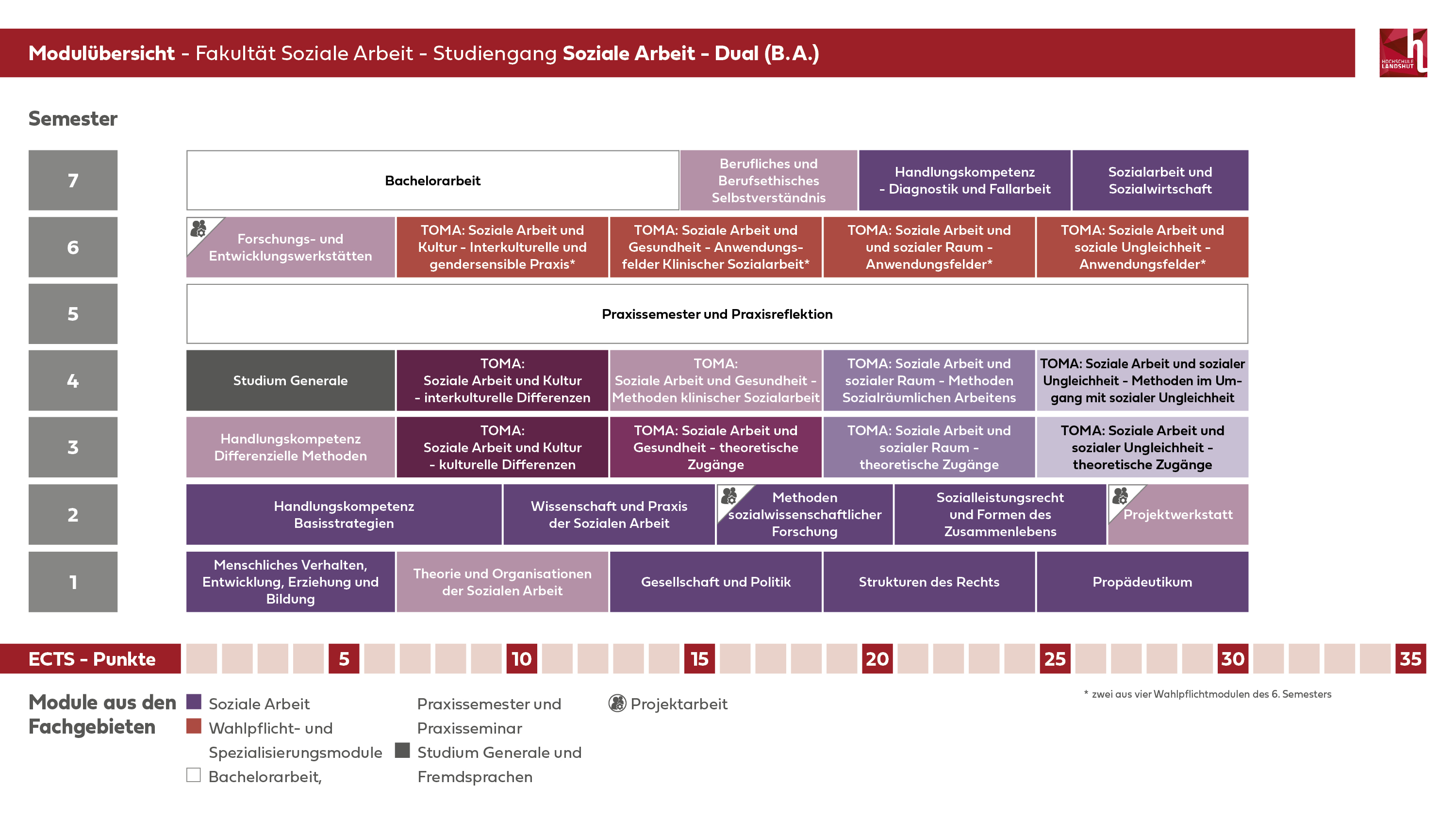
Dual social work with in-depth practice
Bachelor
The aim of the dual undergraduate Bachelor's degree programme in Social Work with in-depth practice is to enable students to act independently and professionally in various fields of social work practice on the basis of scientific knowledge and well-founded methods of action.
| Start | Winter semester |
|---|---|
| Admission Criteria | Unrestricted admission |
| Application period | 15.04.2025 - 15.07.2025 |
| Study format | Full time, with in-depth practical experience |
| Study cost | None (only semester fee) |
| Normal duration | 7 Semester |
| Language | German |
| ECTS | 210 |
Study programme
The concept of the degree programme provides for the TOMA module structure in the third, fourth and sixth semesters. Theoretical, organisational and methodological knowledge- as constitutive forms of knowledge in social work - are systematically transferred into action and application knowledge.
The TOMA modules each focus on different aspects and cover four fundamental socially and socio-educationally relevant areas:
- Social work and diversity
- Social work and health
- Social work and social space
- Social work and social inequality
During the course of the degree programme, students complete 28 of the 30 modules. As a rule, five modules totalling 30 credit points must be completed per semester, which corresponds to a workload of approx. 900 hours. This includes attendance time in courses as well as time for literature study, exercises, exam preparation and performance assessments.
There are compulsory and compulsory elective courses in all modules. The latter allow students to specialise and focus on their own areas of study.
Modulübersicht
Das Studium „Soziale Arbeit Dual mit vertiefter Praxis“ ist gegliedert in ein Grundlagenstudium, welches in den ersten zwei Semestern durchlaufen wird und einem Vertiefungsstudium mit Praxissemester, ab dem dritten Semester. Zu den vermittelten Kenntnissen gehören unter anderem Theorie- und Methodenwissen, die Vermittlung von Handlungskompetenzen und rechtlichen Grundlagen sowie das Erlernen wissenschaftlichen Arbeitens. Ab dem dritten Semester ist das Studium außerdem in inhaltliche Schwerpunktsetzungen zu zentralen Querschnittsthemen aufgeteilt. Diese Themen werden aufeinander aufbauend, zunächst unter theoretischen Aspekten, dann unter methodischen und schließlich unter dem Aspekt der Anwendungsorientierung betrachtet.

Practical semester
The Practical Training Department informs students and Workplaces in the field of social work about the requirements and procedures before, during and after a practical semester.
Learn morePractical phases
In addition to the practical semester, at least 900 hours must be completed in a field of social work or in the area of child and youth welfare as part of the dual degree programme with in-depth practical experience during the course of study. As a rule, these working hours are completed during the lecture-free periods, but can also be completed during the semester by individual arrangement, taking into account the lecture schedule and the placement options and requirements of the institution.
The "Social Work" degree programme is divided into a foundation course, which is completed in the first two semesters, and a specialisation course with an internship semester from the third semester onwards. The knowledge imparted includes theoretical and methodological knowledge, the teaching of practical skills and legal principles as well as learning how to work scientifically. From the third semester onwards, the programme is also divided into thematic focuses on central cross-sectional topics. These topics are considered one after the other, first from a theoretical perspective, then from a methodological perspective and finally from an application-orientated perspective.
- Securing highly qualified and motivated junior staff at an early stage
- Close ties between students and the institution
- Comprehensive practical and organisational experience
- Comprehensive familiarisation phase - there is enough time to find out how best to deploy future graduates
- Elimination of time-consuming familiarisation periods when taking on an employment contract




